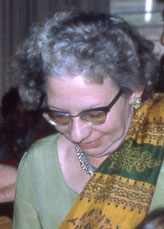
Photo Courtesy of California Historical Society, MSP 3800
I believe that many of us – whether we have no connection to Jonestown, or whether, like myself, we are relatives of the Jonestown dead – are interested in the broad questions about human nature that Jonestown asks. My aunt was Edith Roller, a 62-year-old woman who kept a journal during her years in Peoples Temple, including – more sporadically – during Jonestown’s final year. I hope these journals can shed some light on these question, especially about the shared faith and dedication that the people of Peoples Temple brought to building a kinder world.
The easiest question to ask is why the commonality of purpose – for certainly there was one – become a commonality of fear so great that a significant number of people agreed that it was better to die and/or kill their peers than face whatever they imagined might come next? What did they think would happen if they remained alive to experience it? The will to live is strong; this fear must have been mighty to have overcome that instinct. Edith’s journals can’t touch that, of course, but it’s possible that the tracks of those fears will begin to show in Edith’s later entries. I hope they do.
I think this is an important question. One can be glib about the answer, of course, saying that the people had been bent to do Jim’s will because they accepted him as some sort of “supernatural” creature who was therefore exempt from standard definitions of rationality and morality. And certainly, that has to be one component. And maybe it’s as simple as that. But even that asks a question. Why does being “supernatural” exempt one from generally agreed upon standards of behavior?
Looking at all of this from the narrow perspective of Edith’s life and psyche, I have to ask, too, if most of the people at Jonestown weren’t refugees, one way or another, from a world that does seem too cruel and heartless. Perhaps they were drawn to Jim and susceptible to his world view because they were all suffering from earlier cruelties. Certainly this was true of Edith.
She suffered, like her three sisters, from what we in my generation term “the gene.” It’s an easy way to talk about what manifests as one or another sort of insanity. There are definite markers – certain types of OC behavior being one of them. These girls were collectors: Edith collected words and facts and information and organized them; her sister, Edna, who recently died, had every issue – in order, in boxes – of The Rocky Mountain News, where my father had been city editor, from the time he took that job until the time she had to leave her house; my mother collected plants and pots and all things associated with them but also had rooms filled with all the useful things – pins and bottles and string and so on that one might once again need; and Dorothy, known as Bug, was a true bag lady who filled various Chicago apartments with old clothes and scavenged stuff from people’s trash. She also haunted Goodwill and Salvation Army stores in search of overlooked treasures.
Ah, you say, typical behavior of Depression-era people. Yes, but not so quick there. This came from a deeper and stronger sense of lack. And it certainly wasn’t the only manifestation of “the gene.”
Some of the psychological components are much more difficult to characterize and must go back for generations. There is an iron will and indomitable sense of self-righteousness that mixes with a streak of unbelievable cruelty. It doesn’t do good to rehash old hurts, even those of people long dead, so I won’t. I will say that the sisters were all subjected to it.
Edith’s willingness to teach people how to build incendiaries in the service of what she believed “right action” during the tumultuous 60s may have been her expression of this. That, too, might show up in the journals.
One way or another, we all work to heal from the wounds inflicted on us as children, as do so many other people. I am interested in Edith’s story, and the story of her sisters and the balance of the family, from that perspective: An exploration of the ways we all find to heal our wounds.